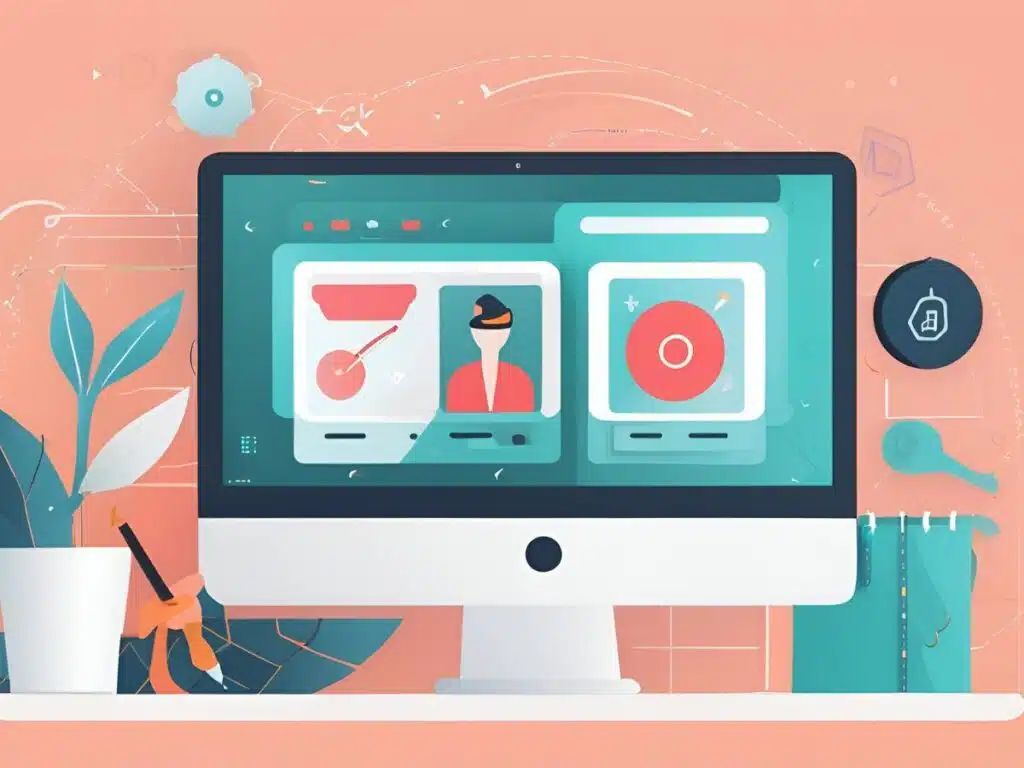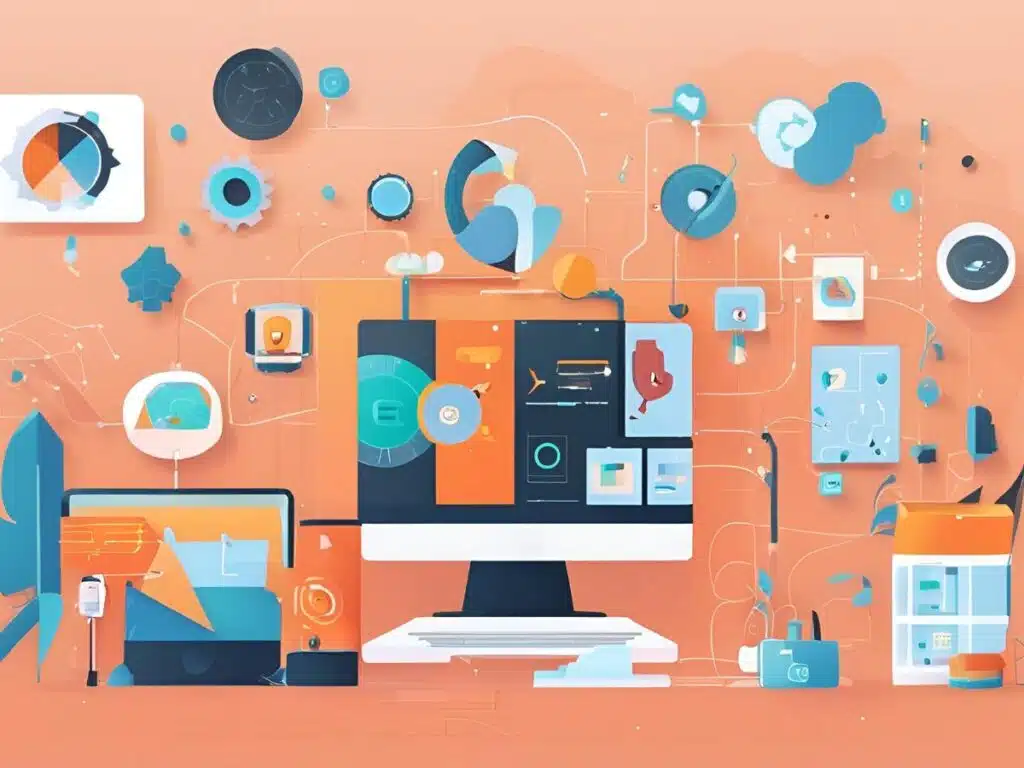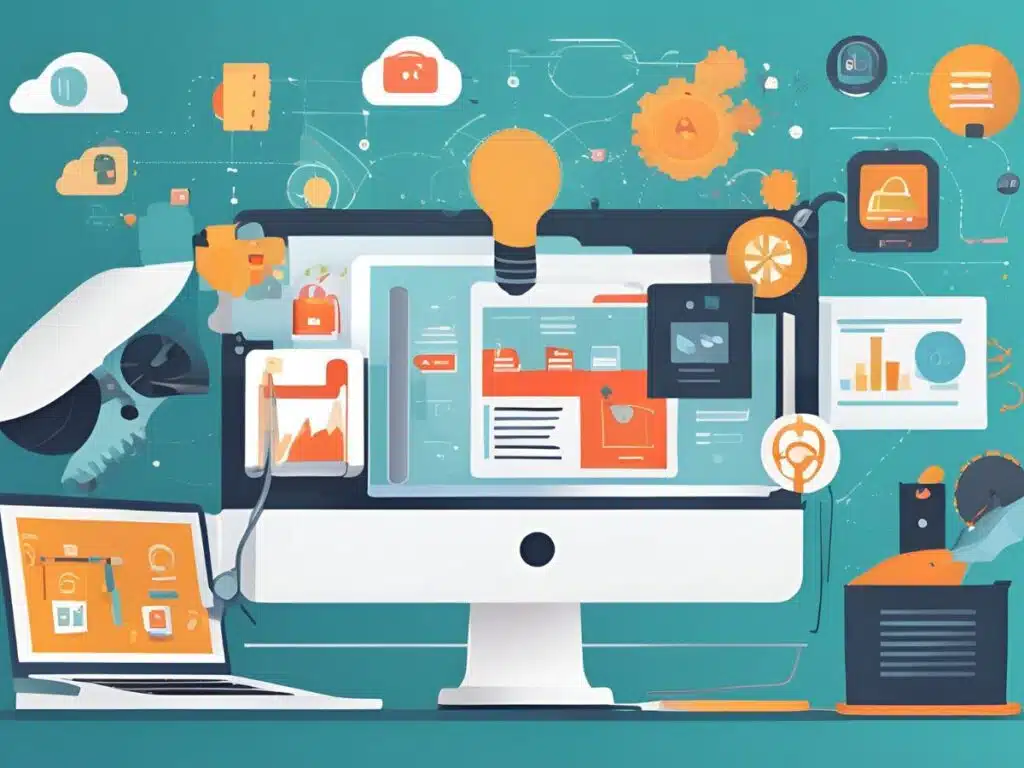Introduction: The AI Revolution in Marketing and Why Free Tools Matter
Welcome to the future of marketing – a landscape constantly reshaped by technology, with Artificial Intelligence (AI) leading the charge. If you’re a digital marketer, a small business owner, or just starting, you’ve likely heard the buzz around AI. It’s not just science fiction anymore; it’s a powerful force transforming how we connect with audiences, create content, analyze data, and ultimately, drive growth.
The marketing world is moving faster than ever. Consumers expect personalized experiences, relevant content, and instant responses. Manually keeping up with these demands while managing campaigns across multiple channels can feel overwhelming, if not impossible. This is where AI steps in, offering solutions that were once the exclusive domain of large corporations with hefty budgets.
But what exactly is AI marketing? In simple terms, it’s the use of AI technologies – like machine learning, natural language processing, and data analysis – to make marketing efforts smarter, faster, and more effective. AI can automate repetitive tasks, uncover deep insights from customer data, predict trends, personalize communications at scale, and even help generate creative content.
AI marketing isn’t just for big spenders anymore. Powerful free AI tools are accessible to everyone, especially those on a budget. This guide highlights the Best free AI tools for marketing to help you leverage AI effectively, compete better, and achieve great results without the high cost.
How Do These Amazing AI Marketing Tools Actually Work? (An Easy Explanation)
The term “Artificial Intelligence” can sound intimidating, conjuring images of complex algorithms and supercomputers. While sophisticated technology is involved, the core concepts behind how most AI marketing tools function are understandable, especially when broken down. Let’s demystify the magic behind the curtain.
Demystifying AI: Core Concepts
At the heart of most AI tools used in marketing are a few key technologies:
- Machine Learning (ML): Think of ML as the AI’s ability to learn from experience without being explicitly programmed for every single scenario. It involves feeding algorithms vast amounts of data. The algorithms identify patterns, learn from them, and make predictions or decisions based on new data.
- Marketing Example: When an e-commerce site suggests products you might like based on your Browse history and past purchases, that’s ML in action. The system learns your preferences and predicts other items that fit your pattern. Many of the Best free AI tools for marketing use ML for tasks like predicting customer behavior or optimizing ad spend (though advanced prediction is often in paid tiers).
- Natural Language Processing (NLP): NLP is a branch of AI focused on enabling computers to understand, interpret, and generate human language. It bridges the gap between human communication and computer understanding.
- Marketing Example: Chatbots that understand your typed questions and provide relevant answers use NLP. Sentiment analysis tools that gauge customer opinions from reviews or social media comments also rely heavily on NLP. Content generation tools use NLP to write human-like text. The Best free AI tools for marketing for content creation leverage NLP extensively.
- Generative AI: This is a subset of AI, often using ML and NLP, that focuses specifically on creating new content. This could be text, images, music, code, or even video, based on the prompts and data it’s given.
- Marketing Example: Tools like ChatGPT or Google Gemini generating blog post ideas, social media captions, or email drafts are prime examples. AI image generators creating unique visuals from text descriptions also fall under this category. Many of the most exciting and accessible Best free AI tools for marketing right now are generative AI tools.
Behind the Scenes: How the “Best free AI tools for marketing” Use These Technologies
So, how do these concepts translate into the functionality of the free tools you can use?
- Data Input and Analysis: AI tools thrive on data. This could be data you provide (like customer lists, website analytics) or data they access from the web (like competitor content, social media trends). The AI analyzes this data far faster and often more comprehensively than a human could. For instance, a free SEO tool might analyze top-ranking pages for a keyword to identify common themes.
- Pattern Recognition: Once data is ingested, the AI looks for patterns, correlations, and anomalies. It might identify which email subject lines lead to higher open rates, which customer segments respond best to certain offers, or what time of day social media posts get the most engagement. Many Best free AI tools for marketing offer basic pattern recognition features within their free tiers.
- Automation of Tasks: One of the most immediate benefits is automation. AI can take over repetitive, time-consuming tasks. Think scheduling social media posts across platforms at optimal times (as suggested by AI analysis), automatically tagging customer support queries, or generating basic performance reports. This automation is a key feature of many Best free AI tools for marketing.
- Content Generation and Suggestions: Leveraging NLP and Generative AI, these tools can assist with or even handle content creation. They can generate blog outlines, draft email copy, suggest social media captions, create variations of ad headlines, or even help brainstorm campaign ideas. This capability makes generative AI platforms some of the Best free AI tools for marketing for content teams.
Essentially, these free AI tools act as intelligent assistants. They process information, identify opportunities or efficiencies, automate routine work, and help create content, all based on the underlying principles of ML, NLP, and generative capabilities, making sophisticated marketing techniques more accessible than ever before.
Why Embrace AI? Unpacking the Benefits of Using the Best Free AI Tools for Marketing
Adopting new technology can sometimes feel like just another item on a never-ending to-do list. However, integrating AI into your marketing strategy, especially through accessible free tools, isn’t just about staying current – it’s about unlocking significant advantages that can fundamentally improve how you work and the results you achieve. Let’s explore the compelling benefits of using the Best free AI tools for marketing.
Benefit 1: Supercharged Efficiency and Automation
Marketing involves numerous repetitive tasks: scheduling posts, compiling basic reports, sorting data, sending standard email responses, and more. These activities consume valuable time that could be spent on strategy, creativity, and relationship-building.
- How AI Helps: The Best free AI tools for marketing excel at automating these routine tasks. Social media schedulers (like Buffer’s free plan) can publish content automatically. AI writing assistants can draft initial versions of emails or posts in seconds. Basic reporting can often be automated through analytics platforms.
- The Payoff: By offloading these tasks to AI, you and your team free up significant bandwidth. This reclaimed time allows marketers to focus on higher-value activities like strategic planning, campaign analysis, creative development, and engaging directly with customers. Efficiency skyrockets, reducing burnout and boosting overall productivity.
Benefit 2: Personalization at Scale Like Never Before
Today’s consumers don’t just appreciate personalization; they expect it. Generic, one-size-fits-all marketing messages are easily ignored. Delivering tailored experiences, however, can dramatically increase engagement and conversions. Doing this manually for every single customer is impossible.
- How AI Helps: AI tools can analyze vast amounts of customer data (Browse history, purchase behavior, demographics, engagement patterns – respecting privacy regulations, of course) to understand individual preferences and predict future needs. Even the Best free AI tools for marketing can offer basic personalization features, such as suggesting personalized email subject lines (Grammarly) or helping segment audiences based on simple criteria. Some free CRM tiers might incorporate basic AI for contact insights.
- The Payoff: AI enables you to deliver more relevant content, product recommendations, and offers to individual customers or highly specific segments, even with limited resources. This leads to higher open rates, click-through rates, conversion rates, improved customer satisfaction, and stronger brand loyalty.
Benefit 3: Data-Driven Decisions Made Easy
Marketing generates a deluge of data: website traffic, social media engagement, email campaign performance, ad clicks, conversion rates, etc. Sifting through this data manually to find meaningful insights can be overwhelming and time-consuming.
- How AI Helps: AI algorithms are built to process and analyze large datasets rapidly. They can identify trends, correlations, and anomalies that might be missed by human analysis. Free tools like Google Analytics 4 incorporate AI to surface key insights automatically. Other Best free AI tools for marketing might offer simplified dashboards that highlight important metrics derived from AI analysis.
- The Payoff: Instead of relying on guesswork or incomplete data, AI empowers you to make informed, data-driven decisions. You can better understand what’s working and what’s not, optimize campaigns more effectively, allocate resources wisely, and ultimately improve your marketing ROI.
Benefit 4: Enhanced Customer Experience (CX)
A positive customer experience is crucial for retention and advocacy. This includes providing timely support, relevant information, and seamless interactions across touchpoints.
- How AI Helps: AI-powered chatbots (many platforms offer free basic tiers, like HubSpot or Tidio, with limitations) can provide instant answers to frequently asked questions 24/7, reducing customer wait times. AI can analyze customer feedback (e.g., sentiment analysis from free social listening tools) to identify pain points and areas for improvement. Even personalized content recommendations contribute to a better CX. Utilizing the Best free AI tools for marketing for customer interaction can significantly uplift the experience.
- The Payoff: Faster response times, readily available information, and personalized interactions lead to increased customer satisfaction, reduced frustration, and stronger relationships, fostering loyalty and positive word-of-mouth.
Benefit 5: Cost-Effectiveness – Maximizing ROI with Free Tools
Perhaps the most compelling benefit for many, especially smaller businesses, is the cost factor. Implementing sophisticated marketing strategies often requires significant investment in software and personnel.
- How AI Helps: The Best free AI tools for marketing provide access to powerful capabilities without the hefty price tag. You can leverage AI for content creation, SEO analysis, social media scheduling, basic automation, and more, often starting with zero budget. This allows you to experiment, learn, and achieve results before committing to paid plans.
- The Payoff: These free tools lower the barrier to entry for adopting advanced marketing techniques. They allow you to achieve more with less, maximizing your return on investment (even if the initial investment is just your time) and enabling leaner operations.
Benefit 6: Improved Targeting and Segmentation
Reaching the right audience with the right message is fundamental to marketing success. Poor targeting wastes resources and yields poor results.
- How AI Helps: AI can analyze customer data to identify distinct segments based on behavior, demographics, preferences, or even predicted likelihood to purchase (though predictive features are often paid). Free tools like Google Analytics 4 offer AI-driven audience insights. The analytical capabilities within many Best free AI tools for marketing help refine audience understanding.
- The Payoff: More precise targeting means your marketing messages are more relevant to the recipients, leading to higher engagement rates and better conversion potential. You spend less time and money reaching uninterested audiences.
Benefit 7: Creative Assistance and Content Generation Boost
Every marketer faces creative blocks sometimes. Coming up with fresh ideas for blog posts, social media campaigns, ad copy, or email newsletters can be challenging.
- How AI Helps: Generative AI tools are fantastic creative partners. They can brainstorm ideas, generate outlines, draft copy, suggest headlines, and even create unique images. Using the Best free AI tools for marketing, like ChatGPT or Canva’s Magic Write, can kickstart the creative process and provide diverse options quickly.
- The Payoff: AI helps overcome writer’s block, speeds up content production, allows for easy testing of different creative angles, and introduces new possibilities, ultimately enhancing the quality and quantity of your marketing content.
By embracing the Best free AI tools for marketing, businesses of all sizes can unlock these substantial benefits, leading to more efficient, effective, personalized, and data-driven marketing operations.
Putting AI to Work: Real-World Use Cases for the Best Free AI Tools in Marketing
Understanding the benefits is one thing; seeing how AI translates into tangible marketing activities is another. The beauty of the current landscape is that many powerful AI applications are accessible through free tools or free tiers of paid platforms. Here are some practical use cases where you can leverage the Best free AI tools for marketing right now:
Content Creation and Curation
Content remains king in digital marketing, but consistently producing high-quality, engaging content is demanding. AI offers significant assistance.
- Generating Blog Post Ideas and Outlines: Stuck for topics? Use tools like ChatGPT (Free Tier) or Google Gemini (Free Tier) to brainstorm ideas based on keywords or themes. Ask them to generate detailed outlines to structure your writing process. These are foundational examples of the Best free AI tools for marketing for content ideation.
- Drafting Social Media Captions: Crafting catchy captions for various platforms takes time. Use Buffer’s AI Assistant (Free Plan), Hootsuite’s Free Caption Generators, or ChatGPT/Gemini to generate multiple options tailored to different networks (Facebook, Instagram, LinkedIn, TikTok).
- Writing Email Subject Lines and Body Copy: Boost open rates with compelling subject lines suggested by AI. Draft initial email copy for newsletters, promotions, or follow-ups using tools like HubSpot’s Free AI Content Writer or general-purpose AI assistants. Grammarly (Free Tier) can then refine the tone and clarity.
- Creating Simple Graphics and Visuals: Visuals are crucial. Canva (Free Tier with AI features) offers tools like ‘Magic Write’ integrated into its design platform, allowing you to generate text for designs and utilize basic AI image editing features (like background removal on certain images). Lexica Art offers free generations for unique AI images.
- Proofreading and Editing Content: Ensure professionalism and clarity. Grammarly (Free Tier) is indispensable for checking grammar, spelling, punctuation, and even tone consistency, making it one of the Best free AI tools for marketing for quality control.

Search Engine Optimization (SEO)
Improving search engine visibility is vital for organic growth. While advanced AI SEO often requires paid tools, free options offer valuable starting points.
- Basic Keyword Research: Understand what your audience is searching for. Google Keyword Planner (requires a free Google Ads account) is a standard starting point. Free tiers of tools like Ahrefs Free SEO Tools or Semrush (Free Account) offer limited keyword generation and analysis features.
- On-Page Content Optimization Suggestions: While writing, tools like Grammarly (Free Tier) can suggest improvements for clarity and readability, indirectly aiding SEO. Some free SEO analysis tools provide basic on-page recommendations (e.g., keyword usage, heading structure).
- Analyzing SERP Features: Understanding Search Engine Results Pages (SERPs) is key. Free browser extensions and tools allow you to analyze current rankings and features, providing context for your optimization efforts. Discovering how the Best free AI tools for marketing can support SEO is crucial.
Social Media Marketing Management
Managing multiple social media profiles efficiently requires organization and timely content.
- Scheduling Posts: Consistency is key. Buffer (Free Plan) allows scheduling up to 10 posts per channel for 3 channels, helping maintain a regular presence. Its AI assistant can also help craft those posts.
- Generating Hashtags: Increase discoverability. Hootsuite’s Free Hashtag Generators (for Instagram, TikTok, etc.) suggest relevant hashtags based on your content or keywords.
- Basic Sentiment Analysis: Understand brand perception. Some free social listening tools (often with limitations) or Hootsuite’s free sentiment analyzer can give you a basic idea of how people feel about your brand or specific topics online.
- Finding Optimal Posting Times: While advanced optimization is often paid, some tools might offer basic suggestions based on general engagement patterns within their free plans. Streamlining social media management is a key function of the Best free AI tools for marketing.
Email Marketing Enhancement
Email remains a high-ROI channel. AI can help optimize your campaigns for better results.
- Personalizing Subject Lines and Greetings: Use AI writing assistants to generate variations of subject lines and greetings, potentially improving open rates through personalization.
- Optimizing Send Times: Some email marketing platforms might offer basic send-time suggestions based on past performance in their free or entry-level tiers.
- A/B Testing Ideas Generation: Use AI tools to brainstorm different angles, calls to action, or copy variations to test within your email campaigns. Utilizing the Best free AI tools for marketing can elevate your email strategy.
Customer Service and Engagement
Providing quick and helpful support is essential.
- Basic AI Chatbots: Handle common queries instantly. Platforms like HubSpot CRM (Free), Tidio (Free Plan), or Manychat (Free Plan) offer basic chatbot functionality to answer FAQs or qualify leads, though advanced features and conversation volume are usually limited.
- Answering Frequently Asked Questions: Program chatbots or use AI text generators to create comprehensive answers for your knowledge base or FAQ pages.
Data Analysis and Reporting
Extracting insights from data helps refine strategies.
- Identifying Basic Trends: Google Analytics 4 (Free) uses AI to automatically surface significant trends, anomalies, and insights about your website traffic and user behavior.
- Simplifying Reporting: AI tools can help summarize lengthy reports or data sets, making it easier to grasp key takeaways quickly. Leveraging the Best free AI tools for marketing for data analysis provides a competitive edge.
Advertising (Limited Free Options)
While most AI-driven ad optimization platforms are paid, free tools can still assist in the creative process.
- Generating Ad Copy Ideas: Use ChatGPT/Gemini or tools like Copy.ai (Free Plan) to brainstorm headlines, descriptions, and calls to action for platforms like Google Ads or Facebook Ads.
- Audience Targeting Insights: While not standalone tools, the AI built into platforms like Google Ads and Meta Ads Manager (which are free to use, you pay for ad spend) helps with audience suggestions and targeting optimization based on campaign goals and data.
These use cases demonstrate that you don’t need a large budget to start implementing AI in your marketing. By strategically using the Best free AI tools for marketing, you can significantly enhance various aspects of your workflow and campaign effectiveness.
Your Toolkit: Popular and Effective – The Best Free AI Tools for Marketing in 2025
Navigating the vast sea of AI tools can be daunting. To help you get started, here’s a curated list of popular and effective options that offer significant value through free plans or tiers. Remember, “free” often comes with limitations (usage caps, feature restrictions), so always check the specific tool’s current offerings. These represent some of the Best free AI tools for marketing available today.
Disclaimer: The AI landscape evolves rapidly. Features and free plan limitations mentioned below are based on information available around early 2025 and are subject to change. Always verify directly with the provider.
Content Creation & Writing Assistance
These tools help brainstorm, draft, refine, and perfect your marketing copy.
- ChatGPT (Free Tier):
- What it does: A highly versatile conversational AI from OpenAI. Excellent for brainstorming ideas, generating text drafts (emails, captions, blog outlines), summarizing content, answering questions, and even basic coding tasks.
- Why it’s one of the Best free AI tools for marketing: Its flexibility and power, even in the free version, make it an invaluable assistant for countless content-related tasks.
- Google Gemini (Free Tier):
- What it does: Google’s answer to ChatGPT, offering similar conversational AI capabilities for text generation, brainstorming, summarization, and Q&A. Often has strong integration with the Google ecosystem.
- Why it’s one of the Best free AI tools for marketing: Provides a powerful alternative or complement to ChatGPT, particularly useful for users heavily invested in Google’s services.
- Grammarly (Free Tier):
- What it does: More than just a spell checker. Analyzes grammar, punctuation, clarity, conciseness, and tone. Provides suggestions for improvement as you write across various platforms (browser extension, desktop app).
- Why it’s one of the Best free AI tools for marketing: Essential for ensuring all written communication is polished, professional, and error-free. The free tier offers immense value for quality control.
- HubSpot AI Content Writer (Free Tools):
- What it does: A suite of AI tools integrated within HubSpot’s free CRM and Marketing Hub offerings. Can generate blog ideas, outlines, paragraphs, social media copy, and website content snippets.
- Why it’s one of the Best free AI tools for marketing: Conveniently integrated if you’re already using HubSpot’s ecosystem, streamlining content creation within your marketing workflow.
- Copy.ai (Free Plan):
- What it does: Focuses on generating various types of marketing copy, including ad copy, product descriptions, email lines, and social media content, using specific templates. The free plan usually offers a limited number of credits per month.
- Why it’s one of the Best free AI tools for marketing: Useful for generating specific, short-form marketing copy quickly, especially when you need inspiration for different formats.
- Picsart AI Content Generator (Free Tier):
- What it does: Part of the Picsart creative suite, this tool generates text content like social media captions, quotes, and sentences, often integrated within their visual editing tools. Offers limited free generations.
- Why it’s one of the Best free AI tools for marketing: Handy for quickly generating short text elements to accompany visual content created in Picsart.
SEO & Analytics
Understanding performance and optimizing for search engines is crucial.
- Google Analytics 4 (GA4):
- What it does: The industry standard for free web analytics. Tracks website traffic, user behavior, conversions, and more. GA4 heavily incorporates AI for predictive audiences, anomaly detection, and automated insights.
- Why it’s one of the Best free AI tools for marketing: Absolutely essential for understanding your website performance and audience. The AI features provide deeper insights automatically.
- Google Search Console:
- What it does: A free service from Google that helps you monitor, maintain, and troubleshoot your site’s presence in Google Search results. Shows search queries, crawl errors, indexing status, and mobile usability.
- Why it’s one of the Best free AI tools for marketing: Provides direct feedback from Google on how your site is performing in search, crucial for any SEO effort.
- Google Keyword Planner:
- What it does: Helps research keywords for search campaigns. Shows search volume estimates, competition levels, and suggests related keywords. Requires a free Google Ads account.
- Why it’s one of the Best free AI tools for marketing: A fundamental tool for understanding search demand and identifying keyword opportunities.
- Ahrefs Free SEO Tools:
- What it does: Ahrefs offers several valuable free tools, including a Website Authority Checker, Backlink Checker, Keyword Generator, and Website Checker (site audit). Limitations apply compared to their full suite.
- Why it’s one of the Best free AI tools for marketing: Provides access to high-quality SEO data points (like backlinks and domain authority) without a subscription, great for spot checks and basic analysis.
- Semrush (Free Account):
- What it does: Similar to Ahrefs, Semrush offers a free account level with limited functionality. You can track a few keywords, audit a small number of site pages, and perform basic competitor analysis.
- Why it’s one of the Best free AI tools for marketing: Allows dipping your toes into a powerful SEO platform and accessing some valuable data for free.
- Bing Webmaster Tools:
- What it does: Microsoft’s equivalent of Google Search Console. Offers site diagnostics, keyword research tools, backlink analysis, and reporting specifically for Bing search engine.
- Why it’s one of the Best free AI tools for marketing: Important for optimizing for Bing, which still holds a significant search market share.

Social Media Management & Generation
Streamline your social presence and content creation.
- Buffer (Free Plan):
- What it does: Allows scheduling up to 10 posts per social channel for up to 3 channels (e.g., Facebook, Instagram, LinkedIn). Includes a landing page builder and an AI Assistant for generating post ideas and captions.
- Why it’s one of the Best free AI tools for marketing: A top choice for basic social media scheduling and content assistance on a budget. The AI assistant adds significant value to the free plan.
- Hootsuite (Free Tools):
- What it does: While their main platform is paid, Hootsuite offers a collection of useful free standalone tools: Hashtag Generators (Instagram, TikTok), Caption Generators, Social Media Image Resizer, Sentiment Analyzer, and more.
- Why it’s one of the Best free AI tools for marketing: Provides targeted utilities to solve specific social media marketing challenges without needing a full platform subscription.
Design and Visuals
Create eye-catching visuals for your campaigns.
- Canva (Free Tier with AI):
- What it does: An incredibly popular and user-friendly graphic design platform. The free tier is very generous and includes access to AI features like Magic Write (text generation within designs), background remover (on select elements), and various templates.
- Why it’s one of the Best free AI tools for marketing: Makes graphic design accessible to everyone. The integrated AI features streamline the creation of social media posts, presentations, simple videos, and more.
- Lexica Art (Free Generations):
- What it does: An AI image generator known for producing high-quality, often artistic or realistic images from text prompts. Offers a limited number of free image generations.
- Why it’s one of the Best free AI tools for marketing: A great option for creating unique, non-stock imagery for blog posts or social media when you need something specific (within free limits).
- Adobe Express (Free Plan):
- What it does: Adobe’s competitor to Canva, offering templates and tools for creating graphics, web pages, and short videos. The free plan includes core features and access to some AI capabilities for design and content generation.
- Why it’s one of the Best free AI tools for marketing: A strong alternative for visual content creation, especially for those familiar with the Adobe ecosystem.
Automation & Integration
Connect your tools and automate workflows.
- Zapier (Free Plan):
- What it does: Allows you to connect different web applications and automate tasks between them (called “Zaps”). The free plan allows a limited number of single-step Zaps and tasks per month.
- Why it’s one of the Best free AI tools for marketing: Indispensable for creating basic automations, like saving email attachments to cloud storage or posting blog updates to social media, connecting your various free tools.
- IFTTT (If This Then That) (Free Plan):
- What it does: Similar to Zapier, IFTTT connects apps and devices to create simple conditional automations (called “Applets”). The free plan allows creating a limited number of Applets.
- Why it’s one of the Best free AI tools for marketing: Another good option for simple task automation between different services you use.
Other Notable Mentions
- Notion AI (Free Add-on with limits):
- What it does: Integrates AI capabilities directly within the popular Notion workspace app. Can summarize notes, brainstorm ideas, draft content, check spelling/grammar, and more. Free usage is typically limited per month/user.
- Why it’s one of the Best free AI tools for marketing: Extremely convenient if your team already uses Notion for project management and documentation.
This list provides a solid foundation for building your AI-powered marketing stack without initial financial commitment. Exploring these Best free AI tools for marketing is the first step towards unlocking greater efficiency and effectiveness.
Beyond Off-the-Shelf: Integrating and Customizing AI for Your Marketing Needs
While the readily available Best free AI tools for marketing offer tremendous value, especially for beginners, understanding how AI can be further integrated and even customized opens up new possibilities as your needs grow. This section isn’t about becoming an AI developer overnight, but rather about grasping the concepts so you can make informed decisions about leveraging AI more deeply in the future.
Understanding the Building Blocks
At a fundamental level, most AI marketing solutions, whether off-the-shelf or custom, rely on three core components:
- Data: AI is data-hungry. The quality and quantity of data fed into an AI system significantly impact its performance. This includes:
- Customer Data: Demographics, purchase history, website interactions, email engagement, CRM notes.
- Market Data: Industry trends, competitor activities, search engine trends, social media conversations.
- Campaign Data: Ad performance metrics, email open/click rates, content engagement statistics. Effective AI use requires collecting, cleaning, and structuring relevant data (always prioritizing privacy and compliance).
- Algorithms/Models: These are the mathematical instructions and frameworks that analyze data and perform tasks.
- Pre-trained Models: Many tools (like ChatGPT or image generators) use large, pre-trained models that have learned from vast datasets. These are powerful and versatile but might lack deep specialization for your specific niche initially.
- Custom Models: Businesses with specific needs and resources might train models on their own proprietary data for highly specialized tasks (e.g., predicting churn for their specific customer base). This is generally beyond the scope of free tools.
- APIs (Application Programming Interfaces): APIs act as messengers, allowing different software tools to communicate and share data or functionality. Many AI tools offer APIs, enabling them to be integrated into other platforms or workflows. This is how you might connect an AI content generator to your website’s CMS or a social media scheduler.
Leveraging Platforms with AI Capabilities
Instead of building from scratch, a common approach is to use existing platforms that have integrated AI features:
- CRM Platforms: Many Customer Relationship Management systems (like HubSpot, Salesforce) are increasingly embedding AI features. These might include AI-powered lead scoring, email content suggestions, predictive insights, and automated data entry – often with basic features available in free or lower-tier plans.
- Marketing Automation Platforms: These platforms (again, HubSpot, Marketo, etc.) use AI for tasks like optimizing email send times, personalizing campaign journeys based on user behavior, and segmenting audiences dynamically.
- No-Code/Low-Code AI Platforms: A newer category of tools (like Relevance AI or TeamAI, as suggested by search results) allows users to build simple AI “agents” or automated workflows with minimal or no coding. You might configure an agent to summarize customer feedback from specific sources or draft personalized outreach messages based on templates and data inputs. This approach allows some customization without deep technical expertise, potentially using components or ideas derived from the Best free AI tools for marketing.
Integrating Existing Tools for Synergy
One of the most practical ways to “customize” your AI setup, especially when starting with free tools, is through integration:
- Using Zapier/IFTTT: These automation platforms are key. You can connect your chosen Best free AI tools for marketing to create seamless workflows.
- Example 1: Automatically send a prompt to ChatGPT whenever a new topic idea is added to a Google Sheet, then save the generated outline back to the sheet.
- Example 2: When you publish a new blog post on WordPress (trigger), use Zapier to send the URL to Buffer (action) to schedule social media promotion posts.
- Example 3: Connect your Typeform survey results to an AI tool via Zapier to automatically analyze sentiment in open-ended responses.
- Leveraging Built-in Integrations: Many tools offer direct integrations with each other (e.g., Grammarly working inside Google Docs, Canva integrating with social media platforms). Explore these native connections first.
The Future: Custom AI Agents?
Looking ahead, the trend is towards more specialized AI “agents” – autonomous programs designed for specific tasks. Platforms are emerging (like those mentioned in search results, Relevance AI, TeamAI) that allow businesses to configure or build these agents. For example, you might envision an agent that constantly monitors competitor pricing and adjusts your ad bids, or one that automatically generates personalized follow-up sequences based on lead interactions.
While building highly sophisticated custom agents might require significant resources or expertise, understanding the concept is valuable. It highlights the potential for deeply tailored AI solutions. However, for most businesses, the journey starts with effectively utilizing and integrating the readily available Best free AI tools for marketing. Mastering these tools provides the foundation and understanding needed to explore more advanced applications later.
Potential Challenges and Considerations with Free AI Tools
While the Best free AI tools for marketing offer incredible opportunities, it’s essential to approach them with a realistic understanding of their potential limitations and challenges. Being aware of these factors will help you use them more effectively and responsibly.
- Limitations of Free Tiers: This is the most common constraint. Free plans almost always come with restrictions compared to paid versions. These can include:
- Usage Caps: Limits on the number of words generated, images created, reports run, social media posts scheduled, or automations executed per month.
- Feature Restrictions: Access only to basic features, with advanced capabilities (e.g., deeper analytics, more customization options, higher quality AI models, priority support) reserved for paying users.
- Watermarks or Branding: Some free visual tools might add watermarks to exports.
- Limited Integrations: Fewer options to connect with other tools compared to paid plans.
- Data History Limits: Analytics tools might restrict how far back you can view historical data.
- Be Prepared: You might outgrow the free tier quickly if you rely heavily on a particular tool. Factor potential upgrades into your future budget planning.
- Data Privacy and Security Concerns: AI tools, especially those analyzing customer data or generating content based on inputs, handle potentially sensitive information.
- Data Usage Policies: Carefully review the tool provider’s privacy policy and terms of service. Understand how your data (and potentially your customers’ data) is used, stored, and protected. Is it used to train their models? Can you opt-out?
- Compliance: Ensure the tools comply with relevant data protection regulations like GDPR or CCPA, especially if dealing with personal data.
- Confidential Information: Be cautious about inputting highly confidential or proprietary business information into public-facing AI tools, particularly free ones where data handling practices might be less stringent or transparent than enterprise solutions.
- Potential for AI Bias and Inaccurate Output: AI models are trained on data, and if that data reflects historical biases (societal, cultural, etc.), the AI’s output can perpetuate those biases.
- Biased Content: AI might generate content that contains stereotypes or excludes certain groups unintentionally.
- Inaccurate Information (“Hallucinations”): Generative AI models can sometimes produce information that sounds plausible but is factually incorrect. They don’t “know” things; they predict likely sequences of words based on their training data.
- Mitigation: Always critically review AI-generated content for accuracy, fairness, and appropriateness before publishing. Fact-check any claims or statistics provided by the AI.
- The Need for Human Oversight and Critical Thinking: AI is a powerful assistant, not a replacement for human judgment, creativity, and strategic thinking.
- Don’t Automate Blindly: Relying solely on AI without review can lead to publishing errors, off-brand messaging, or missed strategic opportunities.
- Strategic Direction: AI can execute tasks, but humans need to set the strategy, define the goals, interpret complex nuances, and make final decisions.
- Creativity and Empathy: While AI can generate creative options, true originality, emotional connection, and brand voice often require human refinement and insight. The Best free AI tools for marketing are most effective when guided by human intelligence.
- Staying Updated: The Fast Pace of AI Development: The field of AI is evolving at breakneck speed. New tools emerge constantly, existing tools update frequently, and best practices change.
- Continuous Learning: Marketers need to stay curious and commit to ongoing learning to keep up with the latest developments and understand how new AI capabilities can be leveraged.
- Tool Evaluation: Regularly reassess your toolkit. A tool that was best-in-class six months ago might have been surpassed by a newer, more capable free option.
By acknowledging these challenges, you can use the Best free AI tools for marketing more strategically, mitigating risks and maximizing their benefits while maintaining control over your brand’s message and strategy.

Conclusion: Start Your AI Marketing Journey with the Best Free Tools Today!
The integration of Artificial Intelligence is no longer a futuristic concept in marketing; it’s a present-day reality offering tangible benefits to businesses of all sizes. From automating tedious tasks and personalizing customer interactions at scale to uncovering deep data insights and boosting creative output, AI is fundamentally reshaping how we approach marketing.
Perhaps the most exciting aspect of this transformation is its increasing accessibility. You don’t need a Fortune 500 budget to start leveraging AI’s power. The proliferation of high-quality, effective, and readily available Best free AI tools for marketing has leveled the playing field, empowering startups, small businesses, non-profits, and individual marketers to enhance their strategies and achieve remarkable results without significant upfront investment.
Throughout this guide, we’ve explored:
- How AI works in a marketing context, demystifying core concepts like ML and NLP.
- The compelling benefits of adopting AI, including efficiency gains, enhanced personalization, data-driven decision-making, and cost-effectiveness.
- Numerous real-world use cases where free AI tools can be applied today, from content creation and SEO to social media management and basic analytics.
- A curated list of some of the Best free AI tools for marketing currently available across various categories.
- Considerations for integrating and customizing AI beyond off-the-shelf tools.
- Important challenges and limitations to keep in mind when using free AI solutions.
The journey into AI marketing doesn’t require a giant leap; it can begin with small, strategic steps. Experimenting with the tools mentioned here – drafting a blog outline with ChatGPT, polishing copy with Grammarly, scheduling posts with Buffer, analyzing traffic with Google Analytics, or designing visuals with Canva’s AI features – can quickly demonstrate their value.
The key is to start exploring. Don’t be intimidated by the technology. Embrace the potential of these powerful assistants to augment your skills, free up your time, and provide you with insights you might otherwise miss. The Best free AI tools for marketing are waiting to become part of your success story.
Frequently Asked Questions (FAQ) – Best Free AI Tools for Marketing
Here are some common questions about leveraging free AI tools for your marketing efforts:
What exactly are the “Best free AI tools for marketing”?
The “Best free AI tools for marketing” refer to software applications that utilize Artificial Intelligence technologies (like machine learning, natural language processing, and generative AI) to assist with various marketing activities. These tasks can include content creation (writing blog posts, social media captions, emails), SEO analysis and keyword research, social media scheduling, customer data analysis, personalization efforts, and creating visuals. The key aspect is that these tools offer valuable functionality through free plans or tiers, making AI accessible without upfront costs. Popular examples include the free versions of ChatGPT, Google Gemini, Grammarly, Google Analytics, Buffer, HubSpot’s Free AI tools, and Canva’s AI features.
I’m a beginner with a small budget. Can I really benefit from using the “Best free AI tools for marketing”?
Absolutely! The Best free AI tools for marketing are incredibly beneficial for beginners, startups, small businesses, and anyone working with limited resources. They provide access to powerful capabilities that can significantly boost efficiency and effectiveness. You can automate time-consuming tasks like scheduling social posts (using Buffer), generate content ideas and drafts (using ChatGPT/Gemini), enhance writing quality (using Grammarly), understand website traffic (using Google Analytics), and create marketing visuals (using Canva). These tools help level the playing field, allowing you to implement sophisticated strategies without a large budget.
Are the “Best free AI tools for marketing” truly free? What’s the catch?
While many excellent AI tools offer genuinely useful free plans, these versions typically have limitations compared to their paid counterparts. The “catch” usually involves:
Usage Limits: Caps on the number of queries, generated words/images, reports, scheduled posts, or automated tasks per month.
Feature Restrictions: Access only to core functionalities, with advanced features (like deeper analytics, more customization, higher-quality AI models, priority support) reserved for paid users.
Limited Integrations: Fewer options to connect with other software compared to paid plans.
Data History: Analytics tools might limit access to older data. The business model relies on users finding value in the free tier and eventually upgrading as their needs expand. However, the Best free AI tools for marketing often provide substantial value even within these limitations.
How can I find the “Best free AI tools for marketing” for my specific needs?
To find the right tools for you:
Identify Pain Points: Determine which marketing tasks are most time-consuming or challenging for you (e.g., content creation, SEO, social media consistency, data analysis).
Research Based on Need: Look for tools specifically designed for those tasks. For content, explore AI writers (ChatGPT, Gemini, HubSpot AI). For social media, check schedulers with AI features (Buffer). For analytics, Google Analytics is fundamental. For SEO basics, look at Google Keyword Planner or free tiers of Ahrefs/Semrush.
Experiment: Sign up for the free plans of a few relevant tools. Test their features and interface to see which of the Best free AI tools for marketing best suits your workflow and provides the most value for your specific requirements.
Read Reviews & Comparisons: Look for recent blog posts (like the one above!) and reviews comparing different free AI marketing tools.
Is it safe to use my business data with the “Best free AI tools for marketing”?
This requires careful consideration. Data privacy and security practices vary widely among AI tools:
Review Policies: Always read the tool provider’s Privacy Policy and Terms of Service before use. Understand how your input data is collected, stored, used (e.g., for model training), and protected.
Free vs. Paid: Free versions, especially public-facing generative AI tools, might use your prompts and inputs to train their models. Paid versions often offer stricter data privacy controls, opt-out possibilities, and compliance certifications (like GDPR, HIPAA).
Sensitive Information: Be extremely cautious about entering highly confidential, proprietary, or sensitive customer data into free AI tools. Assume that data entered into free tools may not be private.
Risk Assessment: If dealing with sensitive data is necessary, weigh the risks and consider investing in paid, enterprise-grade versions of AI tools that offer robust security guarantees when selecting the Best free AI tools for marketing.
Can the “Best free AI tools for marketing” replace human marketers?
No. AI tools are powerful assistants and enhancers, but they cannot replace the strategic thinking, creativity, emotional intelligence, ethical judgment, and complex problem-solving abilities of human marketers. The Best free AI tools for marketing are most effective when used to augment human capabilities – automating routine tasks, providing data insights, generating initial ideas – allowing marketers to focus on strategy, relationship building, nuanced communication, and overall campaign direction.












